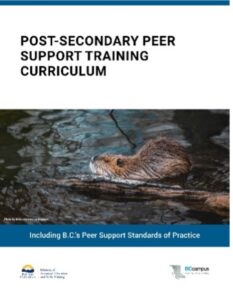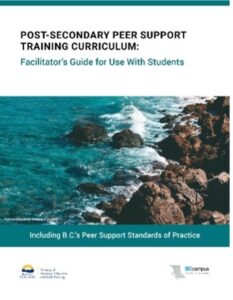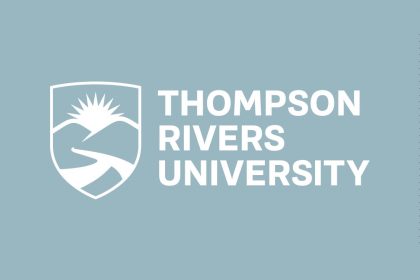“The peer relationship is mutual and reciprocal. Peer support breaks down hierarchies. The peer-support worker and the peer equally co-create the relationship, and both participate in boundary creation.” — from the Post-Secondary Peer Support Training Curriculum
Two brand-new resources will help build foundational skills around peer support for the purpose of promoting mental health and wellness for students in B.C. The Post-Secondary Peer Support Training Curriculum and its accompanying guide, the Post-Secondary Peer Support Training Curriculum: Facilitator’s Guide for Use with Students, constitute the province’s first ever peer-support training curriculum developed specifically for and by the public post-secondary sector. Led by BCcampus, with funding from the Ministry of Advanced Education and Skills Training, this project matured with guidance from an advisory group of students and staff from public post-secondary institutions throughout the province.
Post by the BCcampus editorial team
Project Background
BCcampus co-created the Peer-Support Adaptation Project with the purpose of adapting the resources developed for the Provincial Peer Training Curriculum Project. Completed in 2021, the Provincial Peer Training Curriculum Project was led by BCcampus and funded by the Ministry of Mental Health and Addictions to create a province-wide curriculum for mental health and substance use peer-support workers. The Peer-Support Adaptation Project employed the same subject-matter expert who drafted the original curriculum, Jenn Cusick of Luminate Wellness, who, along with review by an advisory group of students and staff, created these new resources specifically for students.
Adapted (and Adaptable) Training
The Post-Secondary Peer Support Training Curriculum is an openly licensed, accessible, and modular training resource. It includes B.C.’s Peer Support Standards of Practice and contains nine modules. While the original provincial training model was comprised of modules that built one on the other, this adapted training is unique in that the modules can be used separately. This approach creates numerous opportunities for B.C. post-secondary institutions to use the curriculum in the way that best suits their own institutional needs, whether as supplements to their own existing peer-support training program or as the foundation for one.
The Post-Secondary Peer Support Training Curriculum: Facilitator’s Guide for Use with Students is the accompanying facilitator’s guide. It contains sample facilitation templates, suggested module activities, and best practices for delivering the training. It can be used for synchronous training sessions, self-study, and hybrid offerings.
This training curriculum paves the way for compassionate, empathetic, and effective peer support built on the values of lived experience and mutuality. “What this foundational training is really about is building that connection,” said Jenn Cusick. “It’s about learning the skills of how to be a better listener, letting go of one’s biases, appreciating people exactly where they’re at. With peer support you have to be willing to admit that as humans we all struggle. It’s only when we are vulnerable ourselves that we can create the connection and trust that makes peer support what it is.”
Within the modules, learners have the opportunity to develop skills related to peer leadership and facilitation, build personal resilience, connect and communicate, and much, much more. When asked what she was most excited about regarding the release of these new resources, Jenn said:
The best part about sharing this training with students is that the skills garnered from the curriculum are transferable skills for life. Think of all the different vocations we have students training for currently. They are headed into the fields of health care, business, law, etc. What they learn from this kind of training is how to be a better peer, how to be more supportive, empathetic… The implications that participating in this training at the post-secondary level can have on future workplaces — if more of the employees have these tools in their toolkits — is very exciting. At the very least, this training opens the door for more student conversations about peer support, about mental health (which we know is something students struggle with). At the very most, this could better equip those students to support their friends, neighbours, and colleagues in all their future interactions, with the ripple effect on our communities, schools, and workplaces being immeasurable.
Notable Quotes
“The people who best understand the pressures students face are their friends and classmates. When students need help, they often turn to each other first for guidance. Resources like the Post-Secondary Peer Support Training Curriculum give peer-support mentors the skills and training they need to better support other young people, who in turn are reassured when seeking the help of others close to them in age. Peer-support programs are incredibly valuable, especially on post-secondary campuses.”
— Anne Kang, Minister of Advanced Education and Skills Training
“Having this peer-support training resource will support Selkirk to initiate and integrate these types of initiatives. Having a framework and modules developed in this way allows us to integrate the training into our programming to support students who are already doing this work but without the foundational understanding. This resource will bring language and a depth of concepts such as types of leadership, values, strength-based approach, etc., that will support our students to be skilled and caring peer mentors with a very solid foundation for what they are doing and why.”
— Rhonda Schmitz, director of Student Development, Selkirk College
Find both the Post-Secondary Peer Support Training Curriculum and its accompanying facilitator’s guide on the BCcampus Open Publishing website.
Learn more
The featured image for this post (viewable in the BCcampus News section at the bottom of our homepage) is by Keira Burton from Pexels


